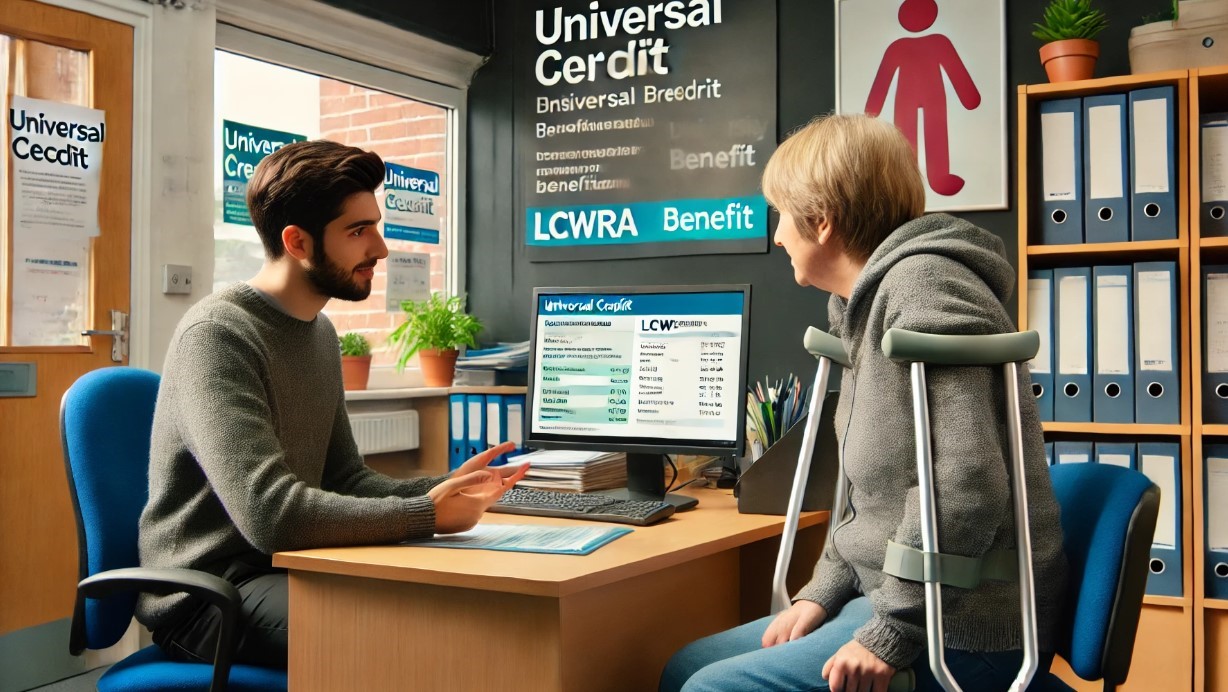Living with a severe health condition or disability can significantly affect your ability to work. If you’re claiming Universal Credit in the UK and your condition limits or prevents you from working, you may qualify for LCWRA (Limited Capability for Work-Related Activity).
Being in the LCWRA group provides not only financial support but also exempts you from any work-related obligations. This guide will explore the conditions that automatically qualify you for LCWRA, how the assessment process works, and what benefits you can expect.
What is LCWRA?

LCWRA is part of the Universal Credit system, designed for people who are unable to work due to physical or mental health conditions.
If you qualify for LCWRA, you are not required to engage in job-seeking activities or participate in work-related training, and you receive higher financial support through Universal Credit.
The LCWRA classification is distinct from LCW (Limited Capability for Work), which means the person has some restrictions but may still need to participate in certain work-related activities, like planning or preparing for employment.
Once placed in the LCWRA group, your ability to work is acknowledged as significantly limited due to your condition, providing you with both financial relief and exemption from job-seeking requirements.
Why is LCWRA Important?
LCWRA is vital for individuals with severe health conditions or disabilities for several reasons:
- Increased Financial Support: Qualifying for LCWRA means you receive an additional payment on top of your regular Universal Credit. This amount is intended to help cover the extra costs associated with your condition.
- Exemption from Work Requirements: Unlike those classified under LCW, if you are in the LCWRA group, you are not required to participate in any work-related activities, such as job searches or training. This is crucial for individuals whose conditions make it impossible or harmful to work.
- Long-Term Security: LCWRA provides long-term support, ensuring that individuals who cannot work due to their condition receive stable financial assistance.
For people with chronic illnesses or disabilities, this can make a significant difference in managing their condition while ensuring they are not pressured to work or meet stringent job-related requirements.
Why Do Certain Conditions That Automatically Qualify You for LCWRA?

Some health conditions automatically qualify you for LCWRA because they are recognized as severely limiting an individual’s ability to work or engage in work-related activities.
The Department for Work and Pensions (DWP) has specific criteria for these automatic qualifications, which generally apply to conditions that are long-term, progressive, or terminal.
Automatic qualification for LCWRA saves individuals from the stress and burden of going through a detailed Work Capability Assessment.
For these conditions, the DWP accepts that the individual’s health is so compromised that working would not be feasible or realistic.
Conditions that typically qualify automatically:
- Severe physical or mental disabilities
- Terminal illnesses
- Conditions requiring long-term treatment or rehabilitation
For these individuals, once their condition is diagnosed and documented, the process of qualifying for LCWRA is often straightforward, reducing the need for assessments and appeals.
What Mental Health Conditions Automatically Qualify for LCWRA?

Mental health conditions can severely limit a person’s ability to engage in daily activities, let alone work. Some of the most severe mental health conditions automatically qualify for LCWRA because they impair the person’s ability to function effectively in a work environment. These conditions include:
- Schizophrenia: This is a severe mental disorder that affects how a person thinks, feels, and behaves. People with schizophrenia often experience hallucinations and delusions, making it challenging to engage in work or social activities. In severe cases, schizophrenia can completely disrupt an individual’s ability to work.
- Bipolar Disorder: Extreme mood swings, including manic and depressive episodes, are a hallmark of bipolar disorder. For individuals with severe bipolar disorder, the unpredictability and intensity of these episodes can make it impossible to maintain employment.
- Severe Depression: Depression can vary in severity, but in cases where the individual’s ability to function is significantly impaired, it can qualify for LCWRA. Severe depression can cause extreme fatigue, loss of motivation, and cognitive impairment, making it difficult for individuals to work.
- Post-Traumatic Stress Disorder (PTSD): Those suffering from severe PTSD often experience flashbacks, anxiety, and panic attacks that interfere with daily activities. If these symptoms are chronic and debilitating, they can result in automatic LCWRA qualification.
These conditions generally require substantial medical documentation to demonstrate their severity. Reports from psychiatrists or mental health specialists can help the DWP understand how the condition impacts the claimant’s ability to work.
Which Physical Conditions Automatically Qualify for LCWRA?

Many physical health conditions automatically qualify for LCWRA, particularly those that cause severe pain, mobility issues, or cognitive impairments.
These include chronic and progressive conditions, where the individual’s ability to work is severely compromised due to physical limitations or the need for ongoing treatment.
Some of the most common physical conditions that automatically qualify include:
- Advanced Cancer: Individuals with advanced-stage cancer, particularly those undergoing chemotherapy or radiotherapy, often automatically qualify for LCWRA due to the debilitating effects of both the illness and its treatment.
- Multiple Sclerosis (MS): MS is a progressive disease affecting the nervous system, leading to physical and cognitive impairments. Over time, many individuals with MS become unable to work due to muscle weakness, fatigue, and coordination problems.
- Severe Arthritis: Conditions like rheumatoid arthritis or osteoarthritis can cause chronic pain and stiffness in the joints, limiting mobility and making work-related tasks difficult. In severe cases, individuals with arthritis may qualify for LCWRA automatically.
- Parkinson’s Disease: As Parkinson’s progresses, it impairs movement, speech, and coordination, making it impossible for many to maintain employment. The degenerative nature of Parkinson’s disease means that work-related activity becomes increasingly difficult.
- Heart Disease: Individuals with chronic heart conditions, such as heart failure, may qualify if their condition severely limits their stamina and ability to perform physical tasks.
The key factor in automatic qualification is how the condition affects your day-to-day living. Medical reports documenting the severity of your symptoms are crucial in these cases.
What Other Conditions May Qualify You for LCWRA?
Other severe conditions or situations may automatically qualify people for LCWRA in addition to mental and physical health issues. These include:
Terminal Illness
If a doctor has diagnosed you with a terminal illness and you are expected to live for six months or less, you will automatically qualify for LCWRA under the special rules for terminal illness (SRTI). The DWP fast-tracks claims for terminally ill individuals, meaning that benefits are provided quickly without the need for a full assessment.
Palliative Care
Individuals receiving palliative care for progressive illnesses are also likely to automatically qualify for LCWRA. Palliative care is focused on managing symptoms rather than curing the illness, and in many cases, individuals in palliative care are unable to work.
Severe Neurological Conditions
Conditions such as motor neurone disease (MND) or Huntington’s disease, which cause rapid and severe deterioration in physical and cognitive function, often result in automatic qualification due to the severity of their symptoms.
How Does the LCWRA Assessment Process Work?

For individuals who do not automatically qualify for LCWRA based on their condition, the Work Capability Assessment (WCA) process determines eligibility. This process involves submitting medical evidence and, in some cases, attending an assessment interview with a health professional.
Key steps in the LCWRA assessment process:
1. Submit Your Claim: When you apply for Universal Credit, you will need to notify the DWP of your health condition. At this point, you will be asked to complete a form that provides details about your medical history and current health status.
2. Provide Medical Evidence: You will need to submit supporting documents, such as GP or specialist reports, that outline your diagnosis, treatment plan, and how the condition affects your daily life and ability to work. It is crucial to ensure this evidence is thorough and up-to-date.
3. Attend an Assessment (If Required): Some claimants may be required to attend a face-to-face or telephone assessment with a healthcare professional. The assessor will ask questions about your condition and how it affects your ability to perform basic tasks like standing, walking, or using your hands.
4. Receive Your Decision: The DWP will review the assessment and medical evidence to determine whether you qualify for LCWRA. If you do, you will be placed in the LCWRA group and receive additional support.
While the assessment process can be stressful, having comprehensive medical reports can help expedite the process and avoid unnecessary delays.
LCWRA First Payment: When Does It Start?
After you’ve been placed in the LCWRA group, it’s important to know that your first LCWRA payment is not immediate. There is a three-month waiting period known as the “assessment period”.
During this time, you won’t receive the additional LCWRA element of Universal Credit, even if you’ve already been awarded LCWRA status.
The LCWRA payments will start after your fourth Universal Credit payment (i.e., in the fourth month). This means that while you’ll receive regular Universal Credit payments, the additional LCWRA amount is only paid once the assessment period is over.
For example, if your LCWRA was awarded in January, you wouldn’t receive the additional LCWRA payments until April. However, the delay in receiving the LCWRA payment is standard and built into the Universal Credit system.
Keep in mind that this waiting period only applies to the LCWRA element and not your base Universal Credit payments.
LCWRA Payment Amount: How Much Will You Receive?

As of 2024, the LCWRA payment amount adds an extra £390.06 per month to your Universal Credit payments. This amount is designed to provide extra financial support for individuals who cannot work due to their health condition or disability.
This payment is added to your regular Universal Credit payment, which will continue as normal. The additional LCWRA element is intended to help cover living expenses that may arise from your inability to work, such as costs associated with healthcare, transportation, or daily living assistance.
The LCWRA amount is consistent, meaning that once you’re approved, you’ll receive this additional amount each month for as long as you remain in the LCWRA group.
If your condition improves and you’re reassessed, this payment may stop, but until then, it provides stable financial support.
If I Get PIP, Will I Also Get LCWRA?
It is possible to receive both Personal Independence Payment (PIP) and LCWRA at the same time, as these two benefits are assessed independently and serve different purposes.
- PIP is awarded based on your daily living needs and mobility issues, helping to cover the additional costs associated with your long-term health condition or disability. It is not dependent on your ability to work.
- LCWRA, on the other hand, is specifically tied to your ability to work and participate in work-related activities under Universal Credit. If your condition prevents you from working, you can qualify for LCWRA.
You are not immediately eligible for LCWRA just because you received PIP, but it can strengthen your case when applying for LCWRA. Both benefits require separate applications and assessments.
Many individuals who receive PIP also qualify for LCWRA, but they must go through the Work Capability Assessment to determine their eligibility for LCWRA. If you’re awarded both, the PIP payments are not affected by the LCWRA payments, and vice versa.
Together, these benefits can provide substantial financial support for those with severe health conditions.
It’s important to understand that while these benefits can be claimed simultaneously, you’ll need to ensure that all medical evidence and documentation clearly outline your health condition to qualify for both.
What Are Common Misconceptions About LCWRA Qualification?

Many people mistakenly believe that any serious condition will automatically qualify them for LCWRA. However, the DWP has specific guidelines for which conditions meet the criteria for automatic qualification.
Even if your condition is serious or long-term, you may still need to go through a health assessment to determine whether you qualify.
Another common misconception is that LCWRA status is permanent. While some conditions may result in long-term LCWRA classification, the DWP may periodically reassess your condition to ensure that you still qualify. If your condition improves or changes, your LCWRA status could be revoked.
What Benefits Do You Receive if You Qualify for LCWRA?
If you qualify for LCWRA, you receive additional financial support on top of your regular Universal Credit payment. This additional amount, known as the LCWRA element, is designed to help cover the extra costs associated with managing your health condition.
In addition to financial support, you are also:
- Exempt from work-related requirements: This means you are not expected to look for work or participate in any work-related activities, such as training or job interviews. For many individuals with severe conditions, this exemption is crucial in reducing stress and allowing them to focus on managing their health.
The financial support you receive can be significant, as the LCWRA element of Universal Credit currently adds an extra £390.06 per month (as of 2024). This payment is designed to help individuals cover additional living expenses, medical care, and other costs that arise from having a long-term health condition or disability.
How Can Long-term Medical Conditions Affect Your LCWRA Qualification?

Long-term medical conditions, particularly those that are degenerative or progressive, often qualify for LCWRA because they severely impact an individual’s ability to perform basic work-related tasks.
Conditions such as chronic obstructive pulmonary disease (COPD), severe diabetes complications, or advanced heart disease can impair both physical stamina and mental functioning, making work impossible or impractical.
In the case of conditions like multiple sclerosis or fibromyalgia, which may fluctuate in severity but progressively worsen, the DWP considers the long-term impact on your ability to engage in employment.
Even if you have good days where your symptoms are manageable, the overall assessment focuses on how the condition affects your ability to work over time.
For those with chronic pain disorders, mobility limitations, or mental health conditions that do not improve with time, the LCWRA classification provides ongoing support, ensuring you are not subject to frequent reassessments unless your condition shows significant improvement.
Can Fluctuating Conditions Qualify You for LCWRA?
Yes, fluctuating conditions can qualify you for LCWRA, even though the symptoms may vary in intensity. The DWP takes into account conditions where the individual experiences “good days” and “bad days,” focusing on how the condition impacts your ability to work on a regular basis.
Conditions like fibromyalgia, chronic fatigue syndrome (ME/CFS), or epilepsy are prime examples of fluctuating conditions that can qualify for LCWRA.
These conditions often cause extreme fatigue, pain, or unpredictable symptoms like seizures, which can make it impossible to maintain regular employment.
The key is providing thorough medical documentation that explains how the condition affects you on most days and why it makes work impractical.
For fluctuating conditions, it is important to:
- Keep detailed medical records that track your symptoms over time.
- Provide evidence from healthcare professionals that outlines the unpredictability and severity of your condition.
- Ensure that your Work Capability Assessment reflects the full extent of how your condition impacts your ability to function, even if symptoms are not always present.
How Does LCWRA Impact Other Benefits You Might Receive?

Qualifying for LCWRA can interact with other benefits you might be entitled to. Most notably, Personal Independence Payment (PIP) is often awarded alongside LCWRA, as it provides financial support for individuals with disabilities or long-term health conditions to help cover additional costs related to their care and mobility needs.
- Personal Independence Payment (PIP): If you are receiving PIP, you may still qualify for LCWRA. Both benefits are assessed independently, but many individuals who qualify for one also receive the other. PIP is designed to cover daily living and mobility needs, while LCWRA focuses on your ability to work.
- Housing Benefit or Universal Credit Housing Element: Qualifying for LCWRA may also increase the amount of housing support you are entitled to. Depending on your situation, you may receive additional support for rent or housing costs.
- Disability Living Allowance (DLA): If you are already receiving DLA (for those who claimed it before PIP was introduced), this can complement your LCWRA status, as both benefits cater to individuals with long-term disabilities.
While LCWRA does not necessarily reduce other benefits, it is important to keep in mind that your overall benefit package will be adjusted to reflect the various entitlements you qualify for.
Conclusion
Qualifying for LCWRA under Universal Credit can provide critical support for individuals with severe health conditions or disabilities.
Whether you have a physical condition, a mental health issue, or a fluctuating illness, LCWRA offers financial assistance and relieves you from the pressure of meeting work-related requirements.
Many serious health conditions automatically qualify you for LCWRA, saving you from the stress of a full assessment. If you think you may qualify, it is essential to consult with your GP and ensure that your medical records accurately reflect the severity of your condition.
Thorough documentation is the key to ensuring that your claim is processed efficiently and fairly. For those facing long-term or life-threatening conditions, LCWRA can make a significant difference in providing both financial stability and peace of mind. It allows you to focus on your health without the added burden of job-seeking requirements.
FAQs
What medical evidence do I need for LCWRA?
To qualify for LCWRA, you’ll need comprehensive medical evidence from your GP or specialist. This should include detailed reports on your diagnosis, treatment plans, and how your condition affects your daily activities and ability to work.
Can I appeal if I don’t qualify automatically?
Yes, if your claim for LCWRA is denied, you can request a mandatory reconsideration or appeal the decision. Providing additional medical evidence or clarifying your condition’s impact on your work capacity can strengthen your appeal.
Do mental health conditions always qualify for LCWRA?
Not all mental health conditions automatically qualify for LCWRA. It depends on the severity and the extent to which the condition affects your ability to engage in work-related activities. Severe conditions like schizophrenia or bipolar disorder may qualify automatically, but others may require assessment.
How long does the LCWRA assessment take?
The LCWRA assessment process can take several weeks to months, depending on your specific case and the availability of assessors. If you qualify automatically based on your condition, this process can be faster.
Is LCWRA different from Personal Independence Payment (PIP)?
Yes, LCWRA is part of Universal Credit and is related to your ability to work, while PIP is a separate benefit that helps with the extra costs of long-term health conditions or disabilities. It is possible to receive both LCWRA and PIP simultaneously.
Can I work while receiving LCWRA?
No, LCWRA is designed for people who cannot work due to their condition. However, you are allowed to volunteer or take part in limited activities that do not interfere with your health. If your condition improves, you may be reassessed.
Does LCWRA affect other benefits?
LCWRA does not negatively affect other benefits like PIP or Housing Benefit. In fact, it can increase the amount of support you receive through Universal Credit, particularly for housing costs.




